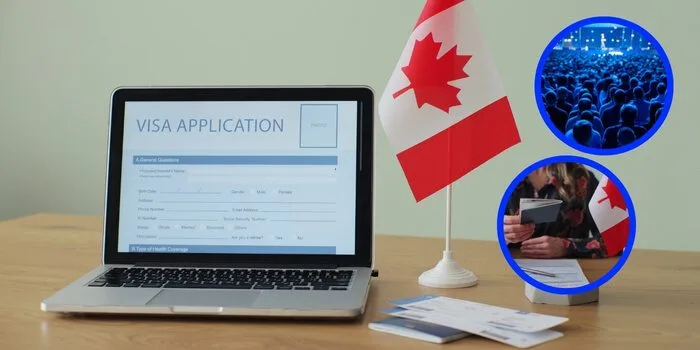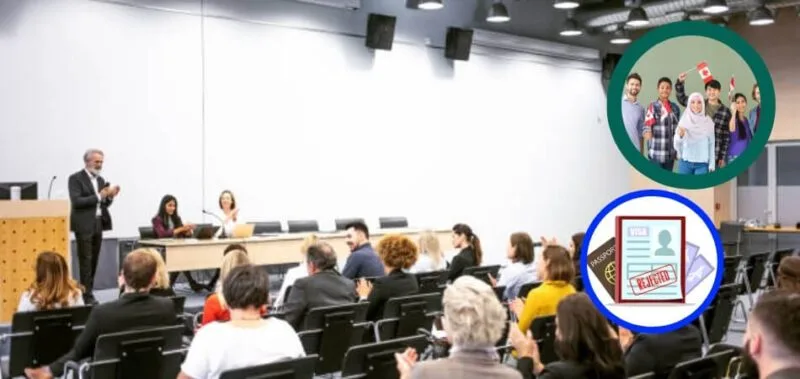A new beginning awaits you when you begin your journey toward obtaining permanent residency in Canada with hope and dreams. During the preparation of your application, a question arises: What happens if I forgot to mention previous conference visa refusal Canada?
It’s a common slip-up that could potentially slow down the process. You might face a delay in your background check if you fail to disclose a prior conference visa refusal in your PR application. Also, this slip may trigger Additional Document Requests (ADRs) for the missing information if the initial refusal wasn’t based on fraud or major immigration violations.
The implications of this complex scenario are crucial for those who are involved in it. To understand the implications fully and how to minimize any potential impacts, continue reading our detailed article.
An Overview of the Canadian Visa Processing System
Canada’s visa system is designed to ensure applicants meet all requirements. To verify the information provided by candidates, each step is meticulously planned. This approach helps maintain the integrity of Canadian immigration policies.

Applicants find the process complex, requiring their careful attention to documents such as financial proof, invitation letters, and supporting documentation, which are provided by trusted event organizers. The timeframe for obtaining a visa may vary based on the type of visa and individual circumstances. Patience and precise adherence to instructions significantly enhance approval chances.
This system can be confusing at first glance because of its nuances. In each phase, applicants can find resources that provide clarity. By utilizing these tools, visa applicants can deal with the complexities of Canadian visa processing more easily.
Required Documents for Canadian Visa Approval
The process of obtaining a Canadian visa involves gathering several key documents. As a result of this process, immigration authorities ensure that applicants meet their criteria. Here’s a concise list of what you’ll need.
- Passport: You must have a valid passport beyond the length of your stay. It serves as the primary identification in your application journey.
- Photographs: Recent, passport-sized photos are required, adhering to Canadian visa photo specifications. These images are crucial for identification purposes.
- Proof of Financial Support: Documents showing your financial stability assure the government you can support yourself during your stay. Bank statements or pay slips often fulfill this requirement.
- Travel Itinerary: If applicable, a detailed plan of your visit, including flight reservations, helps in assessing your application. This document should outline your purpose and duration of stay.
- Employment Letter: A letter from your employer can confirm your ties to your home country and your intention to return. It should detail your job position, salary, and the nature of your visit.
- Invitation Letter: When visiting family or friends, an invitation letter from them in Canada can strengthen your application. This letter should include details about your relationship and the purpose of the visit.
Your journey to becoming a Canadian begins with collecting these documents. By ensuring your visa-related documents are accurate and complete, you can make the application process much smoother.
What Happens If I Forgot to Mention Previous Conference Visa Refusal Canada?
The application process for a Canadian visa requires detailed documentation and honesty. Forgetting to mention a previous conference visa refusal can lead to complications. Here is a detailed explanation of what happens if I forget to mention the previous conference visa refusal in Canada:
Initial Delay
When you miss stating a past refusal, the discovery can slow down the processing. Visa officers will need to cross-check this new information, adding time to your background verification. This step is especially important for those traveling for global events, such as conferences in Canada, where timely approval is crucial. Ensuring accuracy helps maintain the integrity of your application.
Additional Document Requests (ADRs)
Expect to receive a request for more documents to clarify the oversight. ADRs are common when discrepancies arise in your application. They aim to gather more context about the missed refusal. Responding promptly and accurately is key to moving forward.
Impact on Background Check
The background check becomes more thorough after finding undisclosed information. Officers take a closer look at your application’s integrity. This detailed review is to understand the reasons behind the omission. It assesses if it was a simple mistake or intentional.
Possible Need for Explanation
You might be asked to explain why the refusal was not mentioned. Providing a clear, honest explanation can help mitigate the issue. This is your chance to clarify any misunderstanding. It’s important to be straightforward and sincere in your response.
Verification of Intent
The focus will also shift to verifying your intent to abide by Canadian laws. Ensuring that your reasons for visiting are genuine becomes crucial. This step reassures officers of your intentions. It’s about establishing trust and compliance.
Outcome Depends on Circumstances
The final decision is influenced by the nature of the forgotten refusal. If it was for a minor issue, you might still be approved. However, serious reasons like fraud could lead to denial. Each case is assessed individually, considering all factors.
What are the Reasons for Conference Visa Refusal in Canada?
A trip to Canada for a conference can be exciting, but it can also be challenging. Conference visa applicants may encounter a hurdle if their visa is refused. By understanding the reasons for such rejections, you can prepare a more robust application.
- Insufficient Ties to Home Country: Applicants may struggle to prove strong ties to their home country, raising concerns about their return after the conference. It’s essential to show employment, family, or educational commitments.
- Lack of Financial Proof: Failing to provide evidence of sufficient funds to cover your stay in Canada can lead to visa denial. Bank statements and other financial documents are crucial.
- Incomplete Application: Any missing information or documents in the visa application can result in refusal. Double-checking the application for completeness is vital.
- Travel History Concerns: Limited or no travel history can make the visa officer question your travel reliability. A history of compliance with visa conditions in other countries can be beneficial.
- Questionable Conference Credentials: If the authenticity of the conference or your involvement is doubtful, it may lead to refusal. Providing detailed conference information and your participation role is necessary.
- Unclear Purpose of Visit: Not clearly stating your purpose for visiting Canada or how it relates to your professional or academic interests can be problematic. A clear explanation enhances your application’s credibility.
Being aware of these common pitfalls can guide you to submit a more convincing application, increasing your chances of approval.
How Do I Mention Previous Visa Refusal?
The prospect of applying for a new visa after a refusal can seem daunting. It’s crucial to approach this situation with transparency and detail. Mentioning a previous visa refusal correctly can significantly impact your new application.
Here is the step-by-step process of how I mention previous visa refusal:
Step 1: Gather Documentation
Start by collecting all relevant documents related to your previous visa refusal. This includes the refusal letter and any correspondence you had with the visa office. Having these documents at hand will help you provide accurate information in your new application.
Step 2: Review Application Forms for Disclosure Sections
Carefully read through the new visa application forms to identify sections where previous refusals must be disclosed. These sections are specifically designed to gather information about your visa history. Ensure you understand what is being asked to accurately disclose your past refusal.
Step 3: Prepare a Clear Statement
Draft a clear and concise statement explaining the circumstances of your previous visa refusal. Include reasons given by the visa office and any steps you’ve taken to address the reasons for refusal. This statement shows you’re aware of past issues and have made efforts to rectify them.
Step 4: Attach the Refusal Letter
Include a copy of the refusal letter from your previous application with your new application. This provides the visa officers with direct insight into the reasons for your past refusal. It adds credibility to your application by showing transparency.
Step 5: Highlight Changes or Corrections
If the reasons for your previous refusal have been addressed or corrected, highlight these changes in your application. Explain how your circumstances have changed or what new information you’re providing. This demonstrates your commitment to complying with visa requirements.
Step 6: Consult an Immigration Expert
Consider consulting with an immigration expert or lawyer familiar with Canadian immigration policies to review your statement and application. Their expertise can provide valuable insight into how best to present your previous refusal.
Step 7: Review and Submit
Before submitting, thoroughly review your application to ensure all information is accurate and complete. Double-check that your statement about the previous refusal is included and clearly visible. Submitting a well-prepared and honest application is key to a positive outcome.
Following these steps can help you present a strong case to the visa officers, increasing your chances of a successful application.
Tips for Successful Visa Applications
Visas can open doors to new experiences and opportunities. However, the process can seem overwhelming without the right guidance. Here are some tips to help streamline your visa application and increase your chances of success.
- Start Early: Beginning your application process early gives you ample time to gather all necessary documents. This avoids the stress of last-minute rushes which can lead to mistakes.
- Read Instructions Carefully: Every visa type has specific requirements. Paying close attention to the guidelines ensures you provide exactly what’s asked for.
- Organize Documentation: Keeping your documents well-organized makes the application process smoother. It also helps in presenting a clear case to the visa officer.
- Proof of Financial Stability: Demonstrating that you have sufficient funds for your stay is crucial. Bank statements and financial documents should clearly support your application.
- Practice Transparency: Being honest about your travel history and intentions can build trust. Any attempts to conceal facts can lead to refusal.
- Check for Errors: Before submitting, thoroughly review your application for any mistakes. Errors, no matter how small, can impact the decision on your visa.
A successful visa application requires meticulous preparation and clarity. Following these tips can not only simplify the process but also enhance your prospects of approval.
Frequently Asked Questions about What Happens If I Forgot to Mention Previous Conference Visa Refusal Canada?
Here are some of the FAQs and their relevant answers for a clear concept about what happens if I forgot to mention the previous conference visa refusal in Canada:
Can I Correct My Mistake if I Forgot to Mention a Previous Refusal?
Yes, inform the visa office as soon as you realize the mistake, providing a detailed explanation and any relevant documents.
Does a Past Refusal Mean My New Application Will Automatically Be Denied?
No, each application is evaluated on its own merits. A past refusal does not guarantee a new application will be denied.
How Can I Ensure I Don’t Forget Important Details Like a Past Visa Refusal?
Keep detailed records of your travel history and previous immigration interactions, and consider consulting with an immigration expert.
What Details Should I Include When Disclosing a Past Visa Refusal?
Include the refusal date, visa type, issuing country, and reasons for refusal. Attach the refusal letter if possible.
Conclusion
The journey to securing Canadian permanent residency is paved with diligence and an eye for detail. It’s a path filled with aspirations, requiring applicants to meticulously prepare their documentation.
In this process, the question “What happens if I forgot to mention previous conference visa refusal Canada?” serves as a crucial checkpoint for honesty and transparency. This oversight can lead to additional scrutiny and document requests, highlighting the importance of full disclosure.
Successfully overcoming this hurdle reinforces the value of thoroughness and preparation. By understanding and addressing such critical questions, applicants enhance their chances of turning their Canadian dream into reality, marking a significant milestone in their journey.







